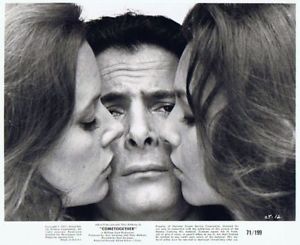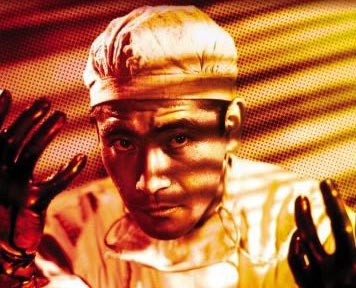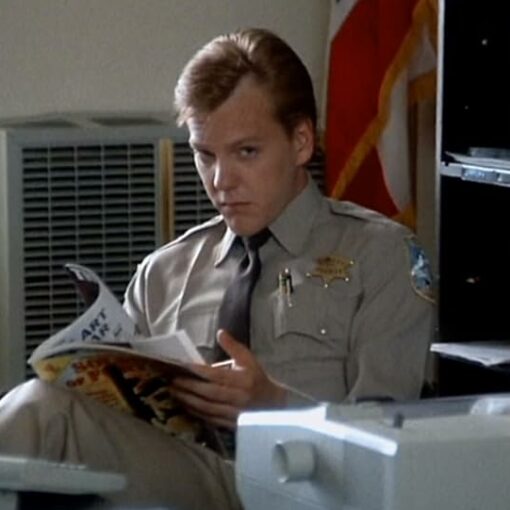Come Together (1971) is a road movie starring spaghetti western actor Tony Anthony.
An American stuntman Tony (Tony Anthony) meets two attractive American tourists – Lisa (Luciana Paluzzi) and Ann (Rosemary Dexter). Initially, Lisa and Ann do not feel any sympathy towards Tony, but the better they get to know him, the more he appeals to them. Eventually, Tony manages to take the two females for a ride so as to show them the beauty of Rome and Venice…

“An insubstantial piece of nostalgia solely aimed at enthusiasts of spaghetti westerns, hippie counter culture and Italy of the seventies”
Come Together (1971) is a unremarkable, vagabond drama written and directed by Saul Swimmer. Despite top-notch names such as Franco Arcalli and Tonino Delli Colli in the crew, this is a haphazardly structured movie which mostly focuses on free love theme, but fails to convey a neat story which could prevent the picture from being something quite remote and virtually lifeless. The sole premise is insufficiently unique to constitute a solid field for further occurrences and as a repercussion, the lack of slick concept greatly impoverishes this already abysmally crafted film. The ad hoc script generally strives to be funny, but it falls short owing to its overall slovenliness entailed by a great deal of aimlessness, a plethora of voice-over and some excessively sweetened sequences. Disparate spots offer some sporadic laughs, yet as a whole, the flick appears immensely incohesive on account of being bereft of conceptual centre and its slapdash storytelling which juggles with scenes like a circus clown with balls. Neither does the motion picture take much notice of the protagonist played by Tony Anthony, nor those two American girls, for they are only shown while sightseeing or rambling around. Hence, the characters and the plot are as superficial and flimsy as they can become.

So as to make amends for overall hollowness of the content, the screenplay resorts to utilising stereotypical situations, coarsely introduced flashbacks and such dignified lines as “You got great tits”. Once these ingredients recede, in the second part, Come Together embarks on relying on its paltry sentimentality which paradoxically enough, camouflages the omnipresent pointlessness partially. Notwithstanding, the unfledged ensemble does succeed in yielding some nice shots of Venice as well as Rome. Being duly filmed by Delli Colli, the Mediterranean imagery beauteously glisters with some garish tints on a couple of occasions. Likewise, the material briefly alludes to Tony’s participation in the war in Vietnam which gently diffuses the dissipated narrative even more, but concomitantly exerts a beneficial impact on Anthony’s character which we eventually get to know something about.

Tony Anthony successfully impersonates the self-confident, crafty and gregarious American stunt actor. Mr Anthony has never been a particularly prominent performer, but his acting ceaselessly comes up to one’s expectations for as much as it never vexes, which is always a good thing. Luciana Paluzzi, known for her role in Thunderball (1965), does her job well, too, as a charming, shady American who was constrained to leave US after an affair which she was involved in. Rosemary Dexter is the least impressive as the third protagonist since she resembles in her wooden performing a dead oak which is to be chopped and used as timber. She seems relatively unnatural in her reactions and at one point, the moment Anthony’s character turns up, her reaction looks uncannily sham vis-à-vis Luciana Paluzzi for instance.

The cinematography by Tonino Delli Colli is not particularly exceptional, but it certainly belongs to one of the best aspects of this feeble drama percolated by numerous foibles. Delli Colli deftly encompasses some distinctive Italian landscapes, exploiting close-ups, swift zooms-in and zooms-out as well as several tracking shots one of which is used while Tony, Lisa and Ann dine in a Venetian restaurant. The soothingly peaceful soundtrack composed by Stelvio Cipriani is very catchy and contextualises very well with the specific cultural framing of those times.

Whilst there are some engaging, time-capsule instants, Come Together predominantly consists of scenes constructed in an unsophisticated, lame manner and ultimately, we are endowed with something astoundingly worthless and bogus. The flick appears to be a mare’s nest – one is capable of choosing his favourite constituent and have some fun, but there is no disguising the fact that Come together is an insubstantial piece of nostalgia solely aimed at enthusiasts of spaghetti westerns, hippie counter culture and Italy of the seventies and a creation of exceeding artificiality which smells outdated like a ten-times-reheated steak doused in a glut of mustard. It is truly dubious that the filmmakers craved to expose something brand new through this huge misfire smacking of sentimentality and dolefulness.
Verdict: 4/10 stars – mediocre







3 thoughts on “Come Together (1971) | OBSCURE PICKS”
I would like to contact Michal. I’m searching for a copy of “Come Together”, a movie that seems impossible to find. Many thanks
I want a copy too.
https://www.somethingweird.com/product_info.php?products_id=22799 if you want a copy